#loki series asks
Explore tagged Tumblr posts
Note

Loki walking up to the counter to order that 100pc box of McNuggets 😂🥴
HA!!!! In a manner that can only be described as….suspicious. As one would purchase a solitary cucumber at the supermarket.
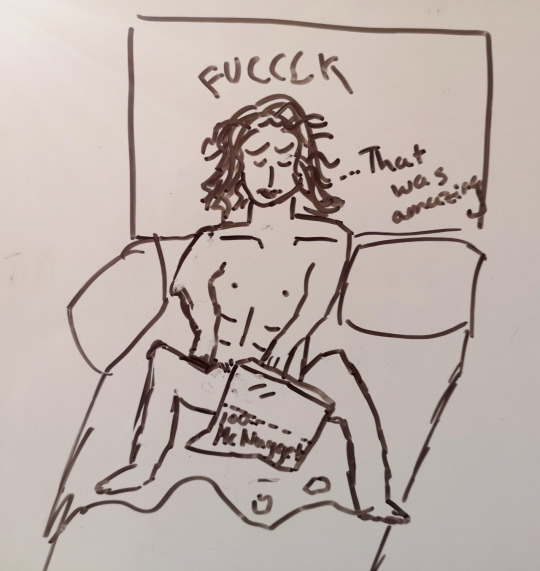
@lokischambermaid if ….and it’s a big if….the McDonald’s scene devolves into some kind of shot of him eating nuggets erotically wrapped in tangled bedsheets mayhaps with some GoM special sauce dripping around the place…would you forgive Fiege? I honestly don’t know 🤣
@xorpsbane
26 notes
·
View notes
Text
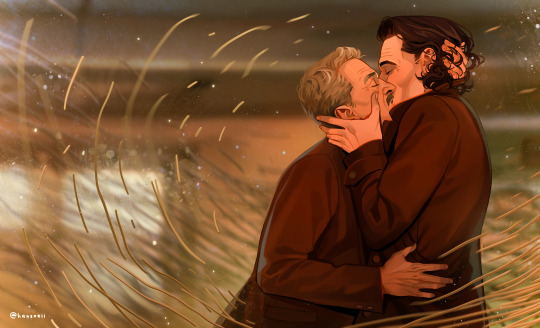
It's about who.
#like hozier said:#if someone asked me at the end I'd tell them “put me back in it”#darling I would do it again if I could hold you for a minute#darling I'd go through it again#I would still be surprised I could find you darling#in any life#hozier wrote francesca for lokius#I have unintentional manifestation skills apparently so I had to put them to use before the finale drops#needed lokius nation to get a kiss no matter what#why was the hardest part about this piece drawing the spaghettification#almost gave up on it because of it#loki#loki series#loki season 2#lokius#lokius fanart#loki fanart#loki mobius#mobius loki#loki laufeyson#my art#digital art#fanart#illustration
17K notes
·
View notes
Note
love your works! How about lokixreader (friends to lover). Where the reader decides to try to get over loki by going on a date because she thing loki doesn’t like her like that. So how loki finds out about her going out on a date and I’ll leave the rest up to you!
You Mischievous Little Thing | Loki Laufeyson x Fem!Reader
HELLOO!!! Thank you so much for this ask :3 I may have not written exactly what you were imagining, however I had a lottt of fun adding to this prompt. I also... wrote quite a bit more than I was expecting, the words just kept coming!! I hope you enjoy!! :D Reminder, asks are still open <3
Masterlist | Marvel Masterlist
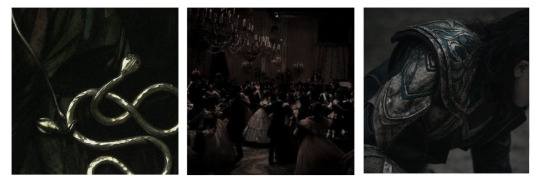
Description: Loki finds you on a date, with another man, wearing his colors.
Warnings: Slight NSFW content, no set timeline, jealous Loki ;), feminine reader, no use of (Y/N), slight knife play.
Word count: 3.8k
mea columba: my dove
⋆⁺₊⋆ ━━━━⊱༒︎ • ༒︎⊰━━━━ ⋆⁺₊⋆
All Mother Frigga was not only known for being one of the smartest and beautiful women of Asgard, but also for the grand soirée’s hosted almost every other week. Typically they were hosted for events, however Frigga also loved to host gatherings for the sake of it, this being one of those times.
You had actually managed to get a date for this ball., and wasn’t an accident. Using it as an opportunity get your mind away from your childhood best friend - The Young Prince, Loki of Asgard.
You had recently come to the realization you had feelings for the man. You noticed your heartbeat would speed up at the littlest of glances, the smallest of smiles, the sweetest of looks.
How you had come to this conclusion was finding your cheeks the brightest of red in the mirror while allowing your mind to fall to the idea of the Prince. You cursed yourself that day, and cursed the God of Mischief for fooling you into these feelings.
You couldn’t help it however, his bashful smiles, his bright blue eyes that seemed to just do things to you - you couldn’t get him out of your mind.
And you knew, he did not feel the same way. I mean, he was Loki of Asgard, and you were you, of… Well, nothing really.
You had met him in the gardens when you were young. Your father was a nobleman on the war council and you had been visiting the castle for a few weeks when you had bumped into the boy. Immediately the two of you clicked, it was easy. You had the same curiosity for the world, the same mischievous and playful spirit, the same yearning to know more, to be more.
And now, centuries later, you lived in the castle. You had moved to the castle at Loki’s request, to help him with his studies to become the Crown Prince for when his brother finally was crowned. Now, you had a rightful seat at the war council - just as your father had.
It had been years of the two of you being side by side, you had become inseparable. Everyone knew it, everyone saw it.
You had both dated others, but nothing ever stuck for either of you. You didn’t mind, until you realized you had feelings for the Young Prince.
So now there you were, down in the Ball Room as hundreds of other Asgardians danced around you all the while awkwardly standing next to your date. Ironically, the only dress you had at the moment to wear was a dark green gown, laced with gold ribbon.
The man you stood beside wasn’t terrible, he was sweet, but just… Boring. It was nothing against him, he was handsome, but he didn’t get your jokes, your sarcasm, or even your compliments. It seemed he truly didn’t have a brain.
You smiled at him as he spoke about battle, in a dramatic fashion - explaining something about decapitating an enemy. You had stopped listening minutes ago, but yet you sipped your drink politely, letting your eyes wander slightly, looking for… Well you know who you were looking for. To your dismay, you had yet to see the blue eyed man.
So you moved your eyes back over to your date, whose name, you actually could not remember for the life of you. He had seemed to now be distracted by one of his friends who had come to speak to him. Seeing as they were now enthralled in a conversation, you took this as the best moment to step away.
You moved quickly, giving a quick muttered excuse to leave and moving carefully to the large banquet table. The foods and deserts upon the table made your mouth water. You reached for a rosatum, thankful for the sweetness that dissolved upon your tongue.
You let your eyes wander again, you watched as couples danced happily upon the dance floor, their lovestruck gazes never leaving each other’s. Your heart panged in an odd manner, was that jealousy? Yearning?
You didn’t know, and preferably, you didn’t want to.
As you were finishing one off of the many drinks you had tonight, you felt a pair of eyes studying you from afar.
You had grown a knack for sensing Loki from what felt like miles away. You were not one for magic, but his magic you could feel. You didn’t know why, you assumed it had something to do with the time you had spent together. However you didn’t mind, he wasn’t able to sneak up on you anymore - he had done it enough.
As your eyes snapped to his, a velvety feeling filled your lungs. A small smile crept up upon your face as you gave him a small curtsey, a running inside joke between you two.
You could see a smile creep up his expression as he bowed his head to you.
You could almost see his eyes graze your figure, but he was too far away to truly tell. Standing the upon golden steps across the room his aura bled confidence, that you could see from hundreds of feet away. He was wearing a beautiful dark green and gold suit plated with golden armor, a show of his status.
You wanted to wave him over, and you almost did - until your date grabbed your shoulder.
“You disappeared back there,” he smiled politely, pulling your attention, albeit begrudgingly, away from the Young Prince across the hall.
You didn’t see how his face fell.
“I apologize,” you smiled half-heartedly.
“I was just getting to the best part,” He laughed, his face red and flushed from alcohol, “I hadn't told you about the beheading!”
He did, a thousand times already.
You hoped your true emotions were not showing upon your face, as that would be quite rude. But truly, you could not stand to be around this man anymore. You had already listened to enough battle re-telling while on the council. You wanted to come up with some excuse to leave, maybe that you had fallen ill - but before you could even get another word out, the hairs on the back of your neck stood.
“Would you care to dance My Lady?”
You spun to the side, unaware of your date’s narrowing eyes upon the man now in front of you both.
“Loki.” you had almost gasped out in relief, he was finally here to rescue you from this horrid date.
His sharp features seemed to soften as they took you in, admiring the gown you had put yourself in. Loki’s eyes met yours again and his feathery gaze fell into an odd stoic wall you could not break through. He smiled politely at your date before holding out his arm for you to grab.
You took it willingly, wrapping your arm with his.
You didn’t even glance back to your date as Loki took you through the crowd, finding a perfect spot for the two of you to dance. You felt yourself become relaxed at the mere presence of him. His familiar oaky and leathery cologne invaded your senses, sending your heart into a frenzy of beats. His hold upon your arm was sturdy and powerful, almost as if proving something. You didn’t question it, happy you now had space between you and the man you were just with.
“A date?” The black haired man finally spoke out. His voice was solid, there was a strong lack of emotions behind his question, throwing you off.
You nodded.
“Y’know, Adrián is one of the stupidest Asgardians I’ve ever met.” He quipped. His tone was void of the typical teasing you were used to, but you smiled and laughed anyway, moving your body with his as you turned to dance with him.
“I realize that now, I actually didn’t even remember his name. I’m not sure he does either, he’s had enough mead for a lifetime.” You smiled, a genuine smile as you gazed up to Loki. Truly taking in his striking features. You had danced together time and time again before, however you always jumped at the chance to admire him. His hair was slicked back and styled, and his blue eyes almost looked green from the reflection of your clothing. “I think I could only handle the same story twice, and I have heard it enough already for a millenia.”
A small smile crept up to Loki’s face at your comment, but yet his stoic facade still stood between you and him. He spun you around once, stepping into place with the others dancing around you.
There was an odd silence between you two at this moment, it made you uneasy. Quiet was normal between you two - time spent together reading by the fire, studying in the archives, or even just spending time going on walks in and around the palace - but this quiet, it was different.
You kept your eyes on him as he failed to meet yours, “Is there something wrong?” You finally asked, your voice filled with genuine concern. You wanted to reach and brush the stray hair from his cheek back behind his ear, but you refrained.
Loki shook his head, licking his lips as he danced your body with his own. His eyes finally falling upon yours as he spoke, “It’s insulting for you to parade yourself out here in my colors, with your arm around another man.”
His words held a certain… frustration, that you could not decipher.
Your lips parted in surprise at his words, your eyes staying upon his as your eyebrows raised, “What?” A small nervous laugh escaping you.
His own eyebrow perked up, spinning you around with him as he scanned the crowd of people beside the group dancing, “Did you do it on purpose?” The irritation in his voice was certain as his eyes met yours again.
You had seen Loki frustrated before, angry even. However this was different - it was an emotion you had not seen upon the man. Your mouth went dry at the accusation, you were confused as to what he was implying - had you understood, you’d probably faint.
“I’m sorry?” You asked again, your voice still holding the nervous laugh from before. Avoiding his gaze you spoke again, “I do not understand what you are insinuating.”
While you failed to meet his gaze, you didn’t fail to notice the pink that seemed to climb up upon his neck. His own eyes flickering away from you to the crowd that surrounded you, he seemed… Nervous.
Suddenly, as if seeing something in the crowd - his eyes glowed with frustration once more before snapping to you again. He spun you around again, your gown glittering under the soft light from the chandeliers. Before pulling you close to his body, leading you two into a gentle waltz. The dancing had now become the background of your focus, giving Loki the authority to lead you was easy.
“Look at you, mea columba. You are adorned in gold and green.” Loki’s eyes scanned you up and down, a dangerous emotion flickering through his blue eyes. “You’re practically mine in those colors.”
Your eyes snapped to his blue ones in surprise. You opened your mouth to respond, but you had nothing on your mind to respond with, you were still mulling over his words in your mind.
Practically his.
You gulped as you closed your mouth, your eyes flitting from his eyes down to his lips, where a small smirk had begun to form upon them. Of course, he was playing a game with you, it seemed he always was. As your eyes met his again, you found the wall that was once there was now broken. You could see his frustration now melt into something different, confidence.
You hadn’t noticed Loki had led you both near one of the many exits of the ballroom. You now had stopped dancing, his arm still leading you two wherever he pleased. You looked around finally, seeing you had stepped past the beautiful archway leading you both down a quiet hall. You didn’t mind, the music was becoming overwhelming.
“It was the only gown that was decent enough for the ball.” The words tumbled from your lips haphazardly, it was the first response you could manage. You cursed yourself internally for drinking as much as you had. Deep down you knew that wasn’t the key to your flustered state, however it was easier to blame.
Loki’s eyebrow perked again at the excuse, leading you to an open isolated balcony looking upon the beautiful Gardens lit under the moonlight below. He turned to you, his arm unlacing with yours and taking a few steps away - keeping his eyes trained to your figure he spoke, “I thought you wore those colors for me.”
You froze, the soft chill of the wind sending shivers up your spine, or was that from him? You couldn’t tell. Swallowing thickly you moved to the edge of the balcony, looking down upon the gardens. Your nerves were on high alert, feeling his gaze upon you as you attempted to ignore him.
You couldn’t, his presence overwhelmed you in a way you couldn’t properly comprehend.
Wearing colors for him? Why would he care? Has he ever cared before?
You couldn’t recall a time where he had.
The silence enveloped the two of you, the only sound being the laughter from the ball room and the soft melody of music that echoed down the hall. Loki’s eyes fixated on you, and your own refusing to meet his. It was a silent battle of push and pull - a simple game which you knew you were losing.
You didn’t notice him pulling nervously at his fingers behind his back.
Knowing you couldn’t just let yourself lose, you pushed back. You felt confidence consume you, as you had played this game with him many times before. Straightening your posture you turned to him, your eyes finding his already upon your form.
They hadn’t left.
And finally - you spoke, bringing the silence to an end.
“I hadn’t realized you laid claim upon a color.”
As the jest fell from your lips, excitement flashed through the prince’s blue eyes. His hands falling to his sides as he moved closer. His body was now mere inches away from yours, you could feel the unusual cold chill from his body that you had grown to find comfort within. His hand reached to lift your chin, his eyes meeting yours.
It seemed as if lightning struck as they connected, your body tensed as the confidence you had just felt faltered for a moment.
A knowing smirk slowly made its way upon Loki’s face. “And anyone that wears it.”
Your breath hitched at the implication, your eyes flicking down his figure before meeting his eyes once again. You gazed at him through your eyelashes, your teeth finding your bottom lip as you returned his playful, smirk.
“Well,” You paused, taking your time to mull over your words as a certain heat rose in your lower half, “If I must, I may just have to - take it off?” You glanced away briefly, “If that pleases you,” you met his blue eyes again, “Your Highness.”
You lowered yourself into a curtsey, your head now below his abdomen. Before you could sink any lower, his cold hand grabbed your upper arm - pulling you back up to him. He was leaning over now, your faces just threads apart.
You could feel Loki’s breath upon your lips as he spoke, “Oh you mischievous little thing,” his tone low and rasping.
Lifting you and setting you upon the bench like railing of the balcony, one hand finding your lower back, his grasp the only thing between you and the gardens below sending a wave of adrenaline through you. His other hand - crawling up your leg under the flurry of skirts you adorned, your own hands finding his neck. He whispered finally, leaning over so that his lips now at your “You know I would like to do that myself.”
Stunned by his sudden actions, his declaration, and the closeness of the two of you - it had seemed as if you had suddenly lost the ability to speak. Your lips parted in surprise, his strong grasp steadying you just enough.
Your nervous gaze fell upon him - his attention fixated upon you. Your lungs shook as you took in a shuddering beeath, searching for the words to say, to continue this game.
But you couldn’t find those words, in fact, he didn’t even give you the chance to - as his lips were now on yours.
Your heart skipped eight beats at once and a small gasp escaped you. His kiss was hesitant at first, but when your eyes fluttered closed, and your hands found his hair, pulling him closer - as if giving him permission - he didn’t restrain himself any longer.
Loki’s hand on your lower back was now moving up to your shoulder blades, moving your body flush to his. The hand that resided within your skirts gripped your thigh tightly - as if he could sink claws into your warm flesh.
As he leaned closer, you broke away - your nervousness from being mere inches to the edge causing your momentous pause. Breathless and shamelessly warm, your lips parted, ready to warn him of your anxieties. His hungry eyes met yours and he spoke for you.
“You think I'd be so foolish as to let you fall?” He clicked his tongue teasingly as he spoke, “The only foolish thing I’ve done is let you be seen in this dress while not by my side.”
A wild glimmer flickered through his icy blue gaze, desperation clawed through them as they trailed down to your gown. As they flicked back up, the mischievous smirk you were used to took hold of his expression. You could see the gears turning in his mind - you knew his next actions would be bad news.
You felt yourself flush with amorous excitement.
Loki’s hand upon your back lowered once more - all the while still holding you sturdy - and his other hand loosened from your thigh. “We wouldn’t want anyone getting the wrong message now,” his eyebrow perked as he cocked his head to the side slightly, his tone low and commanding, but yet far from his usual Prince-like-regality, “Would we?”
You felt a cold sharp object graze where Loki’s hand once was. Your breath hitched as you heard the sharp ripping of fabrics.
Your eyes snapped down, your skirts now cut away, revealing your bare legs and a dagger gripped between Loki’s palm. As he conjured the dagger away in a fluff of green particles, feathery gasp escaped your lips at the sudden coolness of the breeze against your skin. His hand found your thigh once more - however much higher than he had before.
“Much better now,”, he pulled you against him and wrapped your legs around his lower half. His dangerous gaze never seemed to falter.
“Don’t you agree?”
You wanted to disagree, in fact you wanted to yell at him for cutting up such a beautiful gown. But hungry excitement flooded your veins.
“Loki…” You whispered out a warning. You wanted to say more, tell him that this game had gone too far - but the yearning for more clawed through your chest and down through your lower half. Something else told you this wasn’t a game anymore. Your tongue flitted over your lips - Loki’s eyes falling to them - watching as you bit back the words you truly wanted to say.
“Oh mea columba,” He practically groaned out - his voice coated with desperation, “As much as I love seeing you in gold and green, I think I’d much prefer you with nothing on.” As he spoke, his hand on your upper thigh crawled farther up - reaching the hem of your panties.
A soft whimper escaped your lips as his cold fingers played with the hem “If that pleases you, My Prince.”
As the words left you, his gaze shot to yours. His eyes glowed with hunger, so much so that even you could see that he was starving.
“What would please me, is the idea of you never wearing another man's arm -” He paused, his fingers slipping under the hem, his hand grasping the side of your hips. He lowered, his lips finding your jaw - you stretching your neck to give him access. The kisses started slowly, giving you time to move your hands around to his neck and lowering them further down his chest.
“However,” he began again - his lips now lowering down to your neck “You can wear my colors-” He stopped again, his teeth now grazing your collarbone, unbeknownst to you his piercing gaze stared up at you, “As long as I get to claim you as mine.”
You shuddered at his words, realizing this was not a game anymore. This was desire. Your hands found the back of his head once more, his once styled and slicked back hair was now a mess - his natural curls now showing through.
The goosebumps that raised on your flesh was telling enough for Loki, he smirked against your skin. Straightening himself into a stand, all the while kissing you feverishly up your neck and collarbone.
Tightening his grip upon your hip - hovering his lips just breaths away from yours he spoke, “Should we take this to my bed chambers then,” he paused, his sensual gaze now upon yours, “My lady?”
You gazed up at him through your lashes - your body warm with desperation, with the want - no - the need, for more.
“Please-” the plea was barely a word, but instead a hushed moan that you couldn’t control.
At the sound Loki’s eyes flashed - both hands now at your hips, lifting you from the railing. His arms wrapped around you, flushing you against him. You barely had time to register the green particles that surrounded you both, before your head was upon a pillow and soft silk sheets beneath you. Loki’s arm released you gently as he leaned back, now straddling you.
He whipped his hair back, brushing it away from his face as he took a steadying breath, his eyes finding yours again. You noticed he no longer wore gold armour, but just his shite undershirt and black pants that he wore underneath.
Your heart seemed to stutter as you watched him, his biceps flexing as he moved to unbutton half of his shirt. His sensual gaze looking you up and down, sending shivers through your spine, and velvet through you.
“Now,” He spoke finally, pulling your hands that laid at your sides up, above your head onto the headboard. His face now inches from yours once more, “Let’s get this torn gown off of you.”
#loki laufesyon x reader#x reader#loki imagine x reader#loki x reader oneshot#loki imagine#loki oneshot#loki series#loki x reader#mcu loki#marvel loki#loki#loki laufeyson#loki odinson#loki fanfic#loki smut#loki marvel x reader#loki tva x reader#mcu x reader#marvel x reader#marvel#loki reader insert#loki requests#loki request#asks open#mcu#loki comics#thor a dark world#thor ragnarok#thor odinson#frigga
833 notes
·
View notes
Text

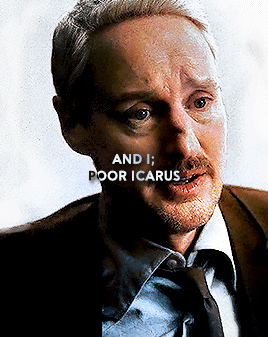
(insp) // (mirror set)
#lokius#mobius#loki#mcuedit#lokiedit#marveledit#been working on a different dual lokius set because yes every scenario of theirs can be mirrored EXACTLY#and realized even months later the reverse of this one hadn't left my mind so have some more tragedy real quick as if they need it 🙃😅#possibly the greatest shot of the entire series tbh it's just such a charged moment??#i mean loki asked for more time and by freely giving it mobius pretty much set into motion the feelings realization crashing around them#the awareness of magnitude in what they've done for each other!!!#your very molecular being torn across time in search of the only unwavering trust and support you've ever known...#shirking everything you were created for to worship a new god not just on a personal alter but now before what was your entire world...#never being normal about them feels so good y'all :')))#owen wilson#tom hiddleston#marvel#owenwilsonedit#dianagifs
375 notes
·
View notes
Text









Loki + tumblr [217/?]
#yes I am very proud of that gag actually thank you for asking#loki#mobius m. mobius#brad wolfe#sylvie#lokius#loki series#mcu#loki memes#lokiedit#text post meme
446 notes
·
View notes
Text

i feel like we deserved more of loki being a creature ..... a little freak..... a kitty cat even...
#don't ask me why I put mobius in a sweater vest I thought he'd look dapper and he DOES . so suck on that#ohhhhshuuuujhfjjvv I l of ghem#lokius#loki#loki laufeyson#loki series#mobius#marvel#marvel fanart#loki fanart#mobius fanart#gurbirty
182 notes
·
View notes
Text
is this a marvel sci-fi tv show, or a fucking ROMANTIC COMEDY
#the tension was INSANEEEEE#on the verge of being on a date#i can't believe them actually#loki fixing himself up before going to mobius#and then mobius offering him a beer#then he asked loki 'are you still on the market?' and reiterated that his wife is loooong gooone KAHSKDHKSHD#tag talk#loki tv show#loki tv series#loki x mobius#loki season 2#loki series#lokius#mobius x loki#mobius m mobius#mobius#tom hiddleston#owen wilson#loki#marvel tv#mcu tv#sci fi#marvel mcu#mcu show#marvel show#disney#but also boycott disney fuck disney PIRATE!!!!! RAH!!!!!
2K notes
·
View notes
Note
💛 reunion kiss / relief + Lokius
If you're so inclined, it's been a while since a good post-S2 reunion went around. But anything you do is lovely. :)
Also requested by @cha-melodius, thank you guys for the prompt! 🥰
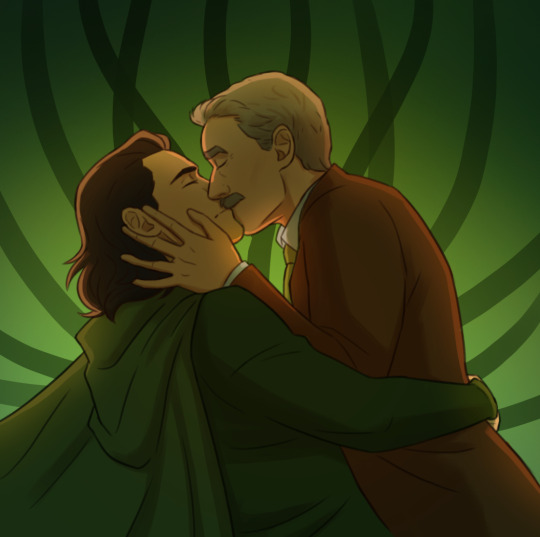
#lokius#loki#mobius#loki series#mcu#ask game#my art#might be slow but i'll definitely get to all the prompts i've received so far! <3
344 notes
·
View notes
Note
Wait did Loki already know about Dick and Jason and all that because he did research /before/ Peter got sent there on not just he was there without telling Peter? And that's why he ended up in that universe specifically cuz he had family there? Or I did I misread something?
oh no Loki is fully lying out of his ass right now. but really he's not lying, it's more like he's not telling the full truth ? idk how much I can really tell you guys cuz I don't want to spoil it... alright, so i can't tell y'all what he was doing specifically but i can tell y'all his general plan and some character insight
i'm feeling in a slightly spoilery mood so!!! if you don't want to know anything about what Loki is up to, don't continue reading! but be aware that at this point in time, there are some things that we just won't know about Loki in the fic itself that i'll talk about here!
before all of this he had absolutely no intentions of teaming up with Peter, he was just exploiting a weakness and trying to get Peter out of the way (this is the same as to what he did with Thor). he knows that Tony would be distracted, and in their efforts to find Peter they would probably be stressed out and their forces would thin because finding usually involves splitting up. they would also have to deal with Mysterio and Ohnn (....and a secret third character 👀). it would give him plenty of opportunity to go in and try and pick them off one by one. except it's not working on the Avengers side. we'll get more to this later 😁
after his first meeting with Peter, Loki figured that Peter would probably be a good place to get some intel if he needed it, because Peter trusted him and was not aware about Loki and his past with the Avengers (or at least not fully aware). the more that he learned about the Bats and Peter's relation to them, as well as learning about Peter, the more he figured it wouldn't hurt to have Peter on his side. he thought that he could twist Peter into believing the Avengers weren't coming. his plans have been shifting around, meeting his needs since the beginning. he's been standing off to the side and pushing the characters around trying to figure out what they will and won't do, like he's observing a game and they have no idea he's moving pieces around when they weren't looking.
however this plan was going to take a lot more time... and Klarion summoning Thor ruined it completely. he had to speed up the process and make his offer quite literally months before he thought he would. so in a way, we can thank Klarion for derailing Loki's plot
Loki had no idea what would happen when he directed Ohnn and Mysterio towards Peter. he knew that Ohnn had been traveling between worlds for a couple of months, but he had no idea if Peter would even survive going to this other universe. he also had no idea about Peter's relation to the Bats until he started digging around for his new plan (Plan: Exploit Peter's Love for his Parents). the thing is, is that his plan would have failed no matter what, because Loki failed to see that Peter's adopted family cares deeply about him, and this bond means just as much as any blood ties he could have. his own insecurities about his standing within his own family got to him. when he was digging around in Peter's life he saw that Peter's foster experience had failed. and he might, maybe, just a little bit... feel bad that the family that was going to adopt Peter were killed because of what happened in the Battle of New York.
so: while he has been very intentionally manipulating Peter... he was thinking of Peter's best interest after a certain point. instead of him not caring what happened to him as long as he was out of the way, Loki did start preparing to make sure that Peter could stay in this world and that he would be taken care of. because i don't believe Loki is an evil person, and even now he's just a little silly. he might have been a little bit crazy with Thor, but to be fair, every other time Loki had a plan and he wasn't crazy enough, Thor came out of it. I feel like they have different standards than what we would as humans. because if you have a sibling then I feel like you'll understand me here... me and my brother used to fight a lot and while we never actually chased each other with knives, we did chase each other with other weapons (whatever wouldn't actually kill but was within our reach) and I think this is their version of that. like me and my brother are super close now but when we were kids we tried to kill each other a lot lmfao. so Thor will probably forgive Loki because that's his brother. (and I'm pretty sure that Loki was under some form of manipulation by Thanos during the Battle of Manhattan/New York??? correct me if I'm wrong, but if that's the case Peter would eventually see that Loki isn't an evil person.) Loki is very chaotic neutral in my eyes, leaning towards evil or good depending on the day. so he's gonna get his ass kicked for trying to take over the world, but like, that's just his enrichment... you gotta let him try every few months/once a year or you're not doing enough to entertain and care for your sneaky God Alien Guy
#I really hope this isn't too spoilery#don't look if you don't want to be spoiled at least a little bit#a lot of this I don't think is going to come up#because I don't think Loki would say this out loud#but it is going to be like sort of implied#because after this we do see a little bit of Loki and Thor but they're not going to be major to the plot#we are quickly approaching our final acts#once Loki is out of the way then we're going to have friendsgiving#after friendsgiving arc we are going into an arc about everything that has been happening for The Avengers (and Ned) for the past month#and then all that's left is to fight Mysterio and Ohnn :)#also another another reminder that this is a series#and when we hit the end of LoF there is another fic after that one (there are 3 planned atm)#loki#thor odinson#ao3 fanfic#leap of faith ao3#peter parker#leap of faith catch me if you can#thank you for the ask!#peter parker in gotham
124 notes
·
View notes
Text
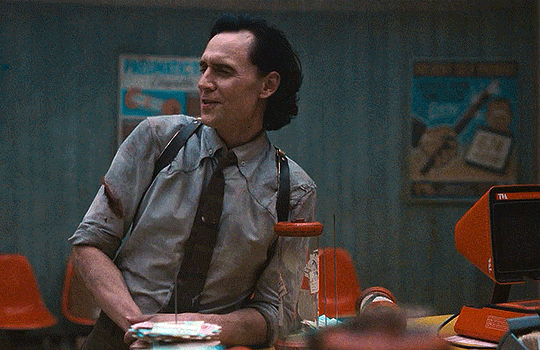



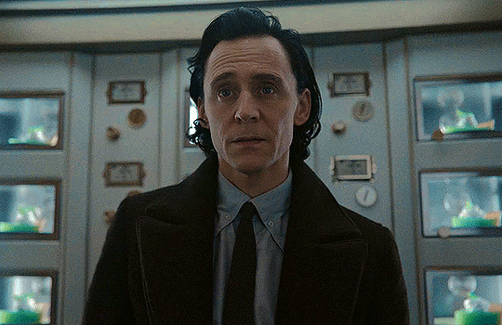
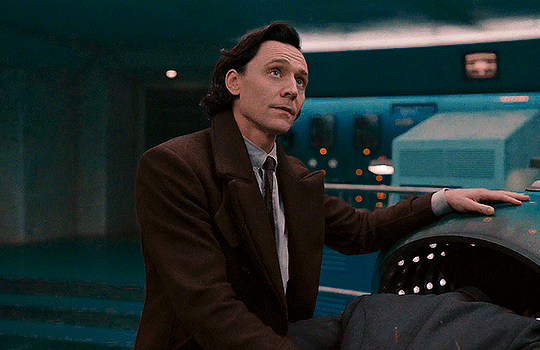
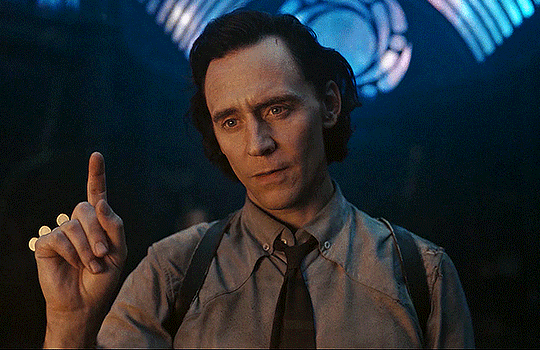
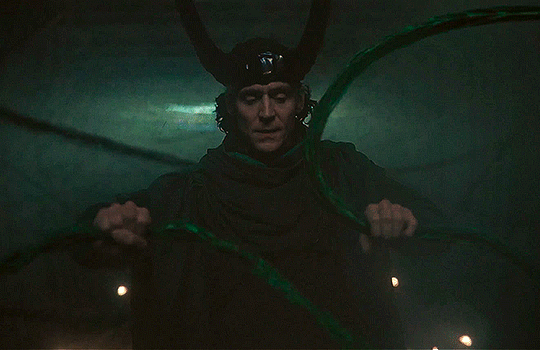
LOKI APPRECIATION WEEK 2023 | for @dailyloki Day 1: Favorite Loki scenes
#loki week starting on my birthday???#couldn't have asked for a better present#lokiweek2023#dailyloki#loki series#loki s2#loki tv#tom hiddleston#*gifs
771 notes
·
View notes
Text
loki CHOSE to only use their powers when mobius told them to. except when mobius was attacked first.

#im severally unwell tysm for asking#lokius#loki spoilers#loki season 2#loki series#loki laufeyson#mobius m mobius
598 notes
·
View notes
Text
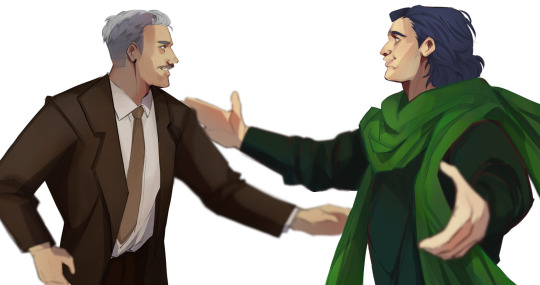
his glorious purpose
#loki#lokius#mobius#mobius m. mobius#loki series#was it too much to ask for them to hug at the finale?#i guess so#seriously-#how many times do i have to draw characters reuniting just cus the show won't do it#????#marvel loki#marvel mobius#art
530 notes
·
View notes
Text
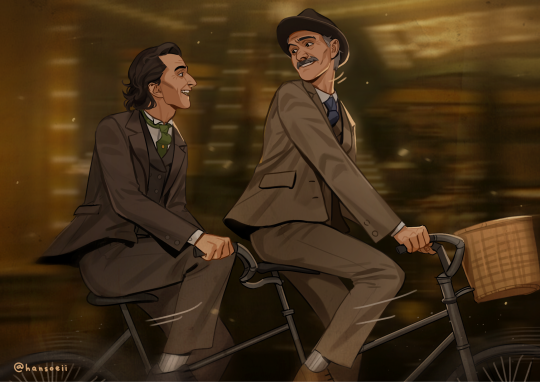
the missing tandem scene!
#how dare they not give us a proper tandem scene#it's all i asked for#so I just drew it myself#loki#loki fanart#loki season 2#lokius#lokius fanart#mobius loki#my art#digital art#fanart#loki series
8K notes
·
View notes
Note
Draw Jedediah (Night at the Museum) being mistaken by Loki (MCU) as Mobius M. Mobius
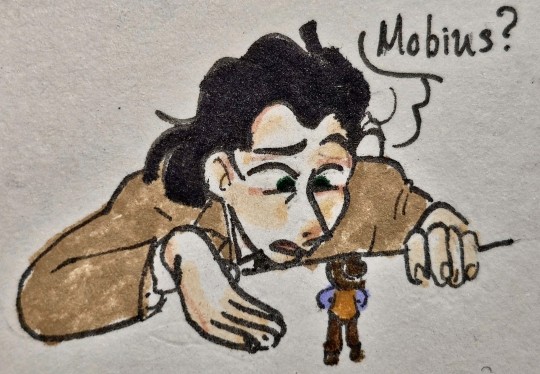
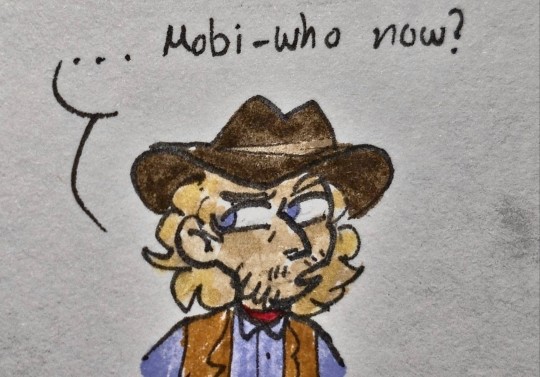
#ooo boy. Loki. I had such high expectations from the show and it didn't deliver at all. at least it was aesthetically pleasing to look at#Loki was my favorite mcu character and he felt so ooc in that show. the plot was kinda junky and was trying too hard (not really a problem)#the 'villains' of the show were so boring? idk I didn't care for any if them#mcu fell when infinity war came out tbh. everything after was mediocre at best. shame. I used to be a huge fan#Anyway you don't care about my opinion on loki the show. you're here to see the god of mischief mistake the silly cowboy for Mobius#ask#anonymous#natm#night at the museum#jedediah#jedediah smith#natm jedediah#loki#loki laufeyson#loki series#art#fanart#traditional art#marvel
144 notes
·
View notes
Note
Why are we just supposed to forget that Loki is a Frost Giant? This is A BIG THING!!! This is the big dark secret, the scandal, the controversy, the tragedy, the horror, the origin, the defining moment, the catalyst, the turning point of no return, and now we're just expected to ...not think about it? Or treat it like it's no big deal, as if it's the same thing as saying Loki has a double-jointed thumb, it's just useless information now? Or laugh about it, as if it’s some kind of embarrassing, hilarious accident of birth Loki deserves for existing? Can you imagine how incredible, how cathartic, how satisfying it could have been, if only? If only.
OH MY GOD YES!! Between the play (Supposedly written by Loki though he felt immense shame over being Jotun, as well as the overall discrimination against Frost Giants from Asgardians…) from Ragnarok, the Loki/Sylvie blanket scene (I don’t care if it was flirting. NEITHER OF THEM WOULD GET COLD FROM A SMALL BREEZE. I DON’T EVEN GET COLD FROM A SMALL BREEZE!), and "Because I see a scared little boy shivering in the cold and you kinda feel bad for that ice runt." From Mobius being like the only reference to Loki’s heritage in the series?! Ugh.
“Am I cursed?”
“Laufey’s son?”
“So I am no more than another stolen relic, locked up here until you might have use of me?
“What, because I.. I.. I am the monster parents tell their children about at night?”
“You know, it all makes sense now, why you favored Thor all these years, because no matter how much you claim to love me, you could never have a Frost Giant sitting on the throne of Asgard!”
“I’m not your brother! I never was!”
“He did tell you my true parentage, did he not?”
(These quotes make me so sad. Poor Loki. He really went through so much.)
Yes, because the same Loki who was in so much distress about his heritage would crack jokes about it and talk openly about it in front of the common people of Asgard, who view Frost Giants as monsters to tell scary stories about to their children, and enemies.
If Loki didn’t find out that he was a Frost Giant… a lot of things would have gone differently not only for him, but as well as other MCU characters. It is essential to his character, and should’ve been talked about more outside of it being used to belittle him, comedy relief, and outside of AUs such as the What If? episode.
It is so unfair. I do also wish it was talked about in TDW, though I know the movie wasn’t necessarily Loki centered.
Haha guys he’s blue and adopted and a runt. It’s so funny and totally not an essential part of his character. It’s not like he’s deeply affected by any of this, or anything. 🤦🏻♀️
#thanks for the ask!#anon ask#ask#asks#my answers#loki#jotun loki#frost giant loki#jotunheim mcu#asgard mcu#frost giants mcu#anti loki series#anti thor ragnarok#loki 💭
91 notes
·
View notes
Note
🎃Trick or treat!🎃
Couldn't help thinking of your Bad Things 'verse and throwing together a little example of Prez eyeing up Don on their first meeting 👀
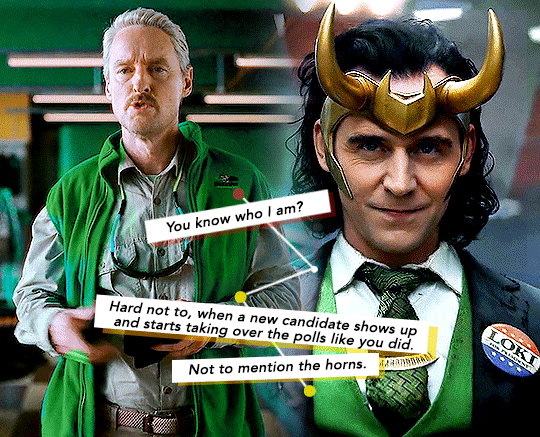
#and i know your version of don is slightly different than the series one but they would look SO good together i couldn't resist#canon don with a loki variant isn't just a want it's a NEED get those kids their stepmom asap <33#lokius#lokius trick or treat 2024#ask
57 notes
·
View notes